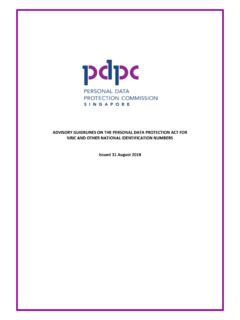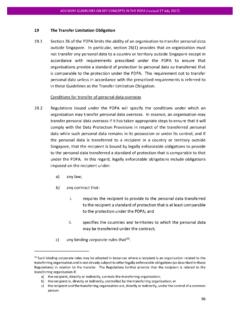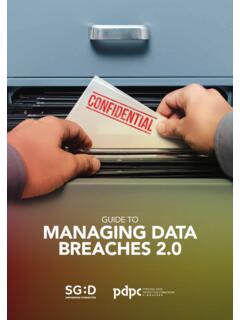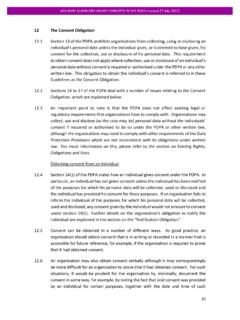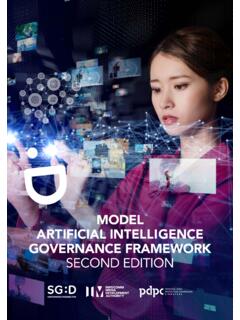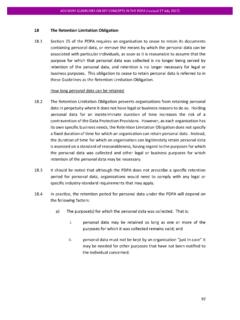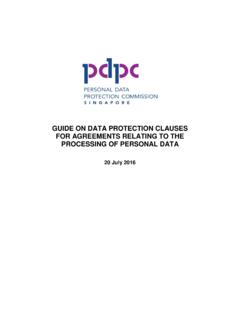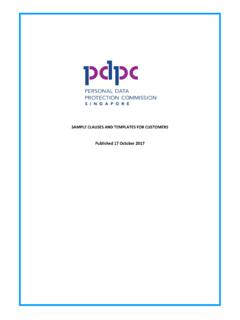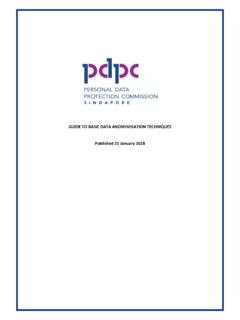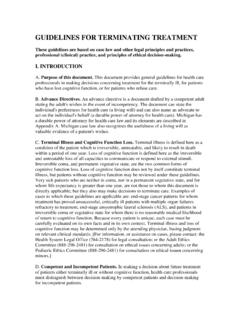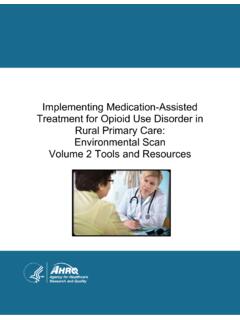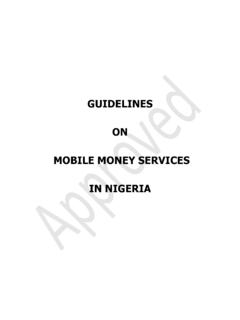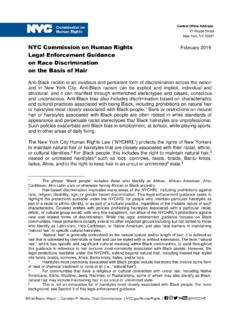Transcription of ADVISORY GUIDELINES ON THE PERSONAL DATA …
1 ADVISORY GUIDELINES ON THE PERSONAL DATA PROTECTION ACT FOR SELECTED TOPICS ISSUED 24 SEPTEMBER 2013 REVISED 31 AUGUST 2018 2 ADVISORY GUIDELINES ON THE PDPA FOR SELECTED TOPICS (revised 31 August 2018) TABLE OF CONTENTS PART I: INTRODUCTION AND 6 1 Introduction .. 6 PART II: SELECTED TOPICS .. 7 2 Analytics and Research .. 7 How does the PDPA apply to organisations that want to conduct analytics and research activities? .. 7 3 Anonymisation .. 9 What is anonymisation? .. 9 Why anonymise PERSONAL data? .. 9 Anonymisation techniques .. 10 Considerations for anonymising data .. 11 Assessing the risks of re-identification .. 12 General test for assessing risks of 15 Managing the risks of re-identification when using or disclosing anonymised data .. 16 4 Photography, Video and Audio Recordings.
2 22 Photography and Videography .. 23 Does a photographer or videographer need to obtain an individual s consent to take a photograph or video recording of the individual? .. 23 Does a photographer or videographer need to obtain an individual s consent to take a photograph or video recording of the individual in a public place? .. 24 How may an individual s consent be obtained for photo-taking or video recording at a private event/space? .. 25 Is a photographer or videographer required to obtain consent from individuals in the background when a photograph or video recording is taken? .. 26 Do professional photographers or videographers need to sign contracts with the event organiser before they can provide photography or videography services at an event?.. 27 Does the exception for collection of PERSONAL data solely for artistic or literary purposes apply to the taking of photographs or video recordings of individuals?
3 28 3 ADVISORY GUIDELINES ON THE PDPA FOR SELECTED TOPICS (revised 31 August 2018) Is an individual who submits a photograph or video recording taken when acting in a PERSONAL or domestic capacity for a competition, still acting in a PERSONAL or domestic capacity? .. 29 Can individuals withdraw consent for the publication of photographs or video recordings, or request under the PDPA for the removal of photographs or video recordings that have been published? .. 29 Does the PDPA affect the copyright in a photograph or video recording? .. 32 Closed-Circuit Television Cameras ( CCTVs ) .. 32 Do organisations always have to provide notifications when CCTVs are deployed? .. 32 Where should notices be placed? .. 32 What should such notices state? .. 33 Is notification still required if CCTVs are there to covertly monitor the premises for security reasons, and notification of the CCTV s location would defeat the purpose of using the CCTVs?
4 33 If my organisation installs CCTVs that also capture footage beyond the boundaries of our premises, is that allowed? .. 33 Is an organisation required to provide access to CCTV footage if it also reveals the PERSONAL data of other individuals? .. 34 Must an organisation provide access to CCTV footage if it doesn t have the technical ability or it is too costly to mask the other individuals whose PERSONAL data are captured in the footage? .. 35 Is an organisation required to provide a copy of CCTV footage pursuant to an access request for the footage? .. 35 Can compromising an organisation s security arrangements or competitive position be sufficient reason to deny access to CCTV footage? .. 36 Can two or more individuals make an access request for the same CCTV footage containing their PERSONAL data, if they consent to their own PERSONAL data being revealed to the others making the access request?
5 36 Is an organisation required to accede to requests to delete CCTV footage? .. 36 Is there a requirement that CCTV footage or video stills be of minimum resolution when provided to individuals upon request? .. 37 Can the organisation require that the individual sign a contract to agree not to disclose to any third party the CCTV footage to be provided to him? .. 37 Where an organisation is providing a copy of the CCTV footage upon request of an individual, must the copy be a video or can it be provided in other formats? .. 37 4 ADVISORY GUIDELINES ON THE PDPA FOR SELECTED TOPICS (revised 31 August 2018) What does video masking or masking refer to? .. 37 Drones .. 38 What should organisations consider when using drones? .. 38 What should organisations do if the drones used are likely to capture PERSONAL data?
6 38 What should organisations do if PERSONAL data was unintentionally collected by the drones? .. 39 5 Employment .. 40 Does an organisation need to seek the consent of a job applicant for the collection and use of his PERSONAL data? .. 40 Can organisations collect and use PERSONAL data on the job applicant from social networking sources ( Facebook or Twitter)? .. 40 Can organisations use the information in business cards for recruitment? .. 41 How long can an organisation keep the PERSONAL data of job applicants who are not hired? . 41 Can job applicants ask the organisation to reveal how much information the organisation has on them or find out why they were not selected? .. 41 How does the PDPA apply to recruitment agencies? .. 42 PERSONAL Data of Employees .. 42 How does the PDPA apply to employment records of employees?
7 42 Collecting, using and disclosing PERSONAL data for the purpose of managing or terminating an employment relationship between the organisation and the individual .. 43 What is the difference between the exception for evaluative purposes and the exception for the purpose of managing and terminating an employment relationship? .. 45 Are organisations responsible if their employees do not comply with the PDPA? Are volunteers considered employees? .. 46 Do the exceptions to the Consent Obligation for the collection, use and disclosure of PERSONAL data of employees also apply to individuals that may act on behalf of an organisation, but are not the organisation s employees? .. 47 6 Online Activities .. 48 Are IP addresses PERSONAL data? .. 48 Must consent be obtained for the use of cookies? .. 49 Are organisations allowed to use cookies for behavioural targeting?
8 50 5 ADVISORY GUIDELINES ON THE PDPA FOR SELECTED TOPICS (revised 31 August 2018) 7 Data Activities Relating to Minors .. 51 When can a minor give valid consent on his own behalf under the PDPA? .. 51 Can a minor s parents or other legal guardians provide valid consent on behalf of the minor under the PDPA? .. 53 When is a minor deemed to have given consent on his own behalf under the PDPA? .. 53 Should organisations adopt a different treatment for the collection, use or disclosure of PERSONAL data about minors? .. 54 Should organisations take extra measures to verify the accuracy of PERSONAL data about minors? .. 55 6 ADVISORY GUIDELINES ON THE PDPA FOR SELECTED TOPICS (revised 31 August 2018) PART I: INTRODUCTION AND OVERVIEW 1 Introduction The PERSONAL Data Protection Act 2012 (the PDPA ) establishes a general data protection law in Singapore which governs the collection, use and disclosure of individuals PERSONAL data by organisations.
9 The PERSONAL Data Protection Commission (the Commission ) is established under the PDPA with the key functions, amongst others, of promoting awareness of data protection in Singapore and administering and enforcing the PDPA. These GUIDELINES should be read in conjunction with the document titled Introduction to the GUIDELINES and are subject to the disclaimers set out It should be noted that the examples in these GUIDELINES serve to illustrate particular aspects of the PDPA, and are not meant to exhaustively address every obligation in the PDPA that would apply in that scenario. 1 Available at 7 ADVISORY GUIDELINES ON THE PDPA FOR SELECTED TOPICS (revised 31 August 2018) PART II: SELECTED TOPICS 2 Analytics and Research How does the PDPA apply to organisations that want to conduct analytics and research activities?
10 Where the research activities carried out by the organisation require the collection, use or disclosure of PERSONAL data, the organisation is required to comply with the PDPA. In particular, under the PDPA, individuals have to be informed of and consent to the purposes for which their PERSONAL data are collected, used, and disclosed by organisations, unless any exception under the PDPA applies. Please see the sections on The Consent Obligation and The Notification Obligation in the Key Concepts GUIDELINES for more details. In respect of the Notification Obligation, an organisation may specify research itself as a purpose and an individual can give consent specifically for the use of his PERSONAL data for research. Alternatively, an organisation may rely on consent given by an individual for a purpose that does not explicitly cover analytics and research if the purpose of the analytics and research falls within the original purpose for which consent was given.
